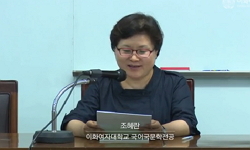The cohesion of lineage groups in Korea is characterized by consanguineous exclusivism and a sense of estate superiority. This sense of exclusive lineage cohesion has often occasioned conflicts between lineage groups. In Wongu-ri village in Yeonghae-m...
http://chineseinput.net/에서 pinyin(병음)방식으로 중국어를 변환할 수 있습니다.
변환된 중국어를 복사하여 사용하시면 됩니다.
- 中文 을 입력하시려면 zhongwen을 입력하시고 space를누르시면됩니다.
- 北京 을 입력하시려면 beijing을 입력하시고 space를 누르시면 됩니다.

삼성(三姓) 종족마을의 혼인연대 = Marriage Alliance of the Three Lineage Groups in a Village - A Case Study of Wongu-ri in Yeonghae Area
한글로보기https://www.riss.kr/link?id=A102575098
- 저자
- 발행기관
- 학술지명
- 권호사항
-
발행연도
2006
-
작성언어
Korean
-
주제어
종족집단 ; 종족마을 ; 혼인연대 ; 배타적 족결합의식 ; 연비친척 ; 양반 ; 동제 ; 줄다리기 ; 마을공동체 ; 혈연성 ; 지연성 ; Sense of exclusive lineage cohesion ; lineage group ; lineage village ; marriage alliance ; inter-lineage solidarity yangban ; dongje ; ropo pulling contest ; village community ; lineage system
-
KDC
331
-
등재정보
KCI등재
-
자료형태
학술저널
-
수록면
251-280(30쪽)
- 제공처
-
0
상세조회 -
0
다운로드
부가정보
다국어 초록 (Multilingual Abstract)
The cohesion of lineage groups in Korea is characterized by consanguineous exclusivism and a sense of estate superiority. This sense of exclusive lineage cohesion has often occasioned conflicts between lineage groups. In Wongu-ri village in Yeonghae-myon, Yeongdeok-gun, Gyeongsangbuk-do, however, three lineage groups, namely Yeongyang-Nam, Daehung-Baek, and Muan-Park clans, have dwelt for about 500 years without much feud with each other. They are regarded as the most noble yangban (scholar-bureaucrat) clans in this area. These three lineage groups in Wongu-ri have been able to achieve a high cohesion through marriage. Not only were the inter-lineage marriages frequent, but the prominent figures in each lineage group were connected with each other through marriage, thus greatly contributing to the inter-lineage solidarity. Sometimes they further consolidated their cohesion by marrying members of their lineage group to the persons in close affinity. In this marriage alliance, Yeongyang-Nam clan has played an important role as a hub group. Marriage was usually arranged between Yeongyang-Nam and Muan-Park clan members, and between Yeongyang-Nam and Daehung-Baek clan members. In this way the three lineage groups have strengthened their solidarity with Yeongyang-Nam clan as a linkage. Although marriage between Muan-Park and Daehung-Baek clan members is of rare occurrence, they are also closely related with each other through the intermediary of Yeongyang-Nam group, since they can be maternal relatives of maternal side or maternal relatives of wife`s family of each other`s. The three lineage groups in this village cooperated to hold the dongje, village-god worship rites. They also sublimated the rope pulling contest, which was supposed to be a form of inter-lineage rivalry, into a common festivity of the entire village community that may contribute to the integration of the whole villagers. Villages in Korea have been formed in a combination of lineage system and community system. The two systems are closely interrelated but, as they have different natures, they are in conflict, too. The conflict between lineage groups in a village can be seen as the clash and contradiction between the system of lineage(or consanguinity) and that of community(or territoriality). Our study shows that the marriage alliance can reconcile the two systems, alleviate and prevent the conflicts and hostilities between various intra-community social groups, and thus consolidate the solidarity of the whole community.
동일학술지(권/호) 다른 논문
-
식민지 인민은 말할 수 없는가?: "동아신질서론"과 조선의 지식인
- 한국사회사학회
- 이진경 ( Jinkyung Yi )
- 2006
- KCI등재
-
- 한국사회사학회
- 강상규 ( Sang Gyu Kang )
- 2006
- KCI등재
-
- 한국사회사학회
- 이승일 ( Seung Il Lee )
- 2006
- KCI등재
-
- 한국사회사학회
- 전상숙 ( Sangsook Jeon )
- 2006
- KCI등재




 KISS
KISS






